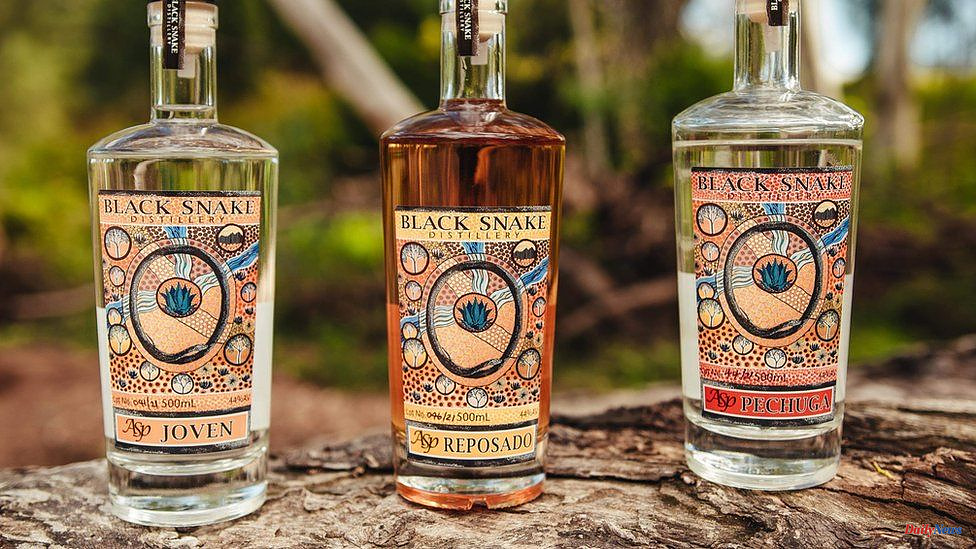Many thousands of cactus-like, large-sized plants, like cactus, sprout from sun-baked earth. They are surrounded by green-brown hills.
This crop, also known as agaves when they reach maturity in six to eight years, will be harvested. To make Mexico's favorite spirit, the plant heart will be cooked and fermented.
Don't ever use the term tequila. This crop is 14,000km (8.700 miles) from Mexico in Australia.
Tequila (and mezcal, its sister spirit) can only be made from Mexican agaves in Mexico. The juice of these Australian plants will be made into "Australian Agave Spirit" in the end.
These agaves can be grown in Queensland in a microclimate that is "dry tropical", between Airlie Beach (on the coast) and Bowen (on the Whitsunday islands).
Other plantations exist in New South Wales, South Australia.
Top Shelf International (TSI) is growing all 500,000 Queensland agaves. The company first began planting them in the last year.
Trent Fraser, TSI president, is leading the project. He was elected last year. He was born and raised in South Australia. Prior to that, he worked in Mexico for six years, helping the French luxury goods and beverages giant LVMH launch Volcan de mi Terra, its own tequila brand.
"Where Jalisco lies 20 degrees north of equator," Mr Fraser says about Queensland.
He explained that both the temperature and rainfall levels are nearly identical in both locations, making them ideal for growing agave spirits. The agave plant loves the sun. It thrives when there is plenty of heat and sunlight.
TSI collaborates with horticulturalists at Adelaide University to optimize growing conditions. It has also been awarded a research grant by the Australian government.
Fraser says that agave plants don't need to be fussy. The plant is very resilient. It's almost like it's really strong. It can even grow along the curbside of concrete roads.
Black Snake Distillery, a family-owned business located in the east of Australia, is already producing agave spirit close to Narrabri in New South Wales, about 500km north of Sydney.
Rosemary and Steve Beale had been inspired by their daughter's return from the Americas to create a mezcal-style spirit. They suggested that the agaves found along their farm's creek might be similar to the ones used to make mezcal and tequila.
It was discovered that the species is a decorative agave called agave Americana. This is different than the blue agave plant used in tequila (this is the type being grown at TSI in Queensland).
Blue agave does not contain saponins. These organic chemicals give Agave americana a soapy flavor and slow down the process of fermentation. The Black Snake Distillery, however, has a method of extracting saponins from the plant's spikey arms.
Black Snake spirit is thought to have a distinctive flavour than traditional Mexican mezcal due to the use of agave Americana.
Rosemary Beale says that the taste is very vegetal and green but also peppery, spicy. People have felt that they could taste the mint and the melon when we roast the agave with eucalyptus.
The Beales' agave spirits can be found in Australia and have won a silver medal at 2021 London Spirits Awards. Black Snake has had to learn the hard way of creating an agave spirit that isn't influenced by hundreds of years worth of tradition.
Ms Beale says, "It's difficult making agave spirits here in Australia." "We didn't have anyone to turn to for assistance. There were many flavors and batches that I did not like.
According to one report, the tequila market is a major money-spinner in Mexico. Last year, global sales reached $13bn. Sales of mezcal amounted to $790 million. The main difference between the two drinks lies in the fact that tequila must be made only from blue agaves from one region of Mexico while mezcal can be made with any agave from the entire country.
Although agaves are being grown in a number of countries, they can also be made into spirit drinks by India and the US, their production is much smaller than that of Mexico.
Luis Fernando Felix Fernandez is the president of the National Chamber of the Tequila Industry. He says that it is difficult for foreign distilleries make convincing agave spirits. Fernandez says that this is due to the fact that Mexicans have been fermenting and understanding agave for generations.
Fernandez stressed his responsibility to preserve the "denominations of origin" of tequila and to protect the cultural identity that is unique to Mexico.
He says, "They [Australians] are able to make some drinks, but they can't call it tequila. That clearly detracts the chances of success. Because what people today know is a drink called tequila."
The Beales traveled from Australia to Mexico to learn from mezcal and tequila makers to make the best agave spirits. They also rely on the guidance of Mexicans throughout the fermentation and distillation process.
Fraser said he would also seek help from Mexican growers once his agaves have been harvested. He says, "If my Mexican friends [his Jalisco family] end up spitting out it, we have a problem."
The booming global demand of tequila is expected to continue. The value of worldwide sales is predicted to increase by more than twice between 2021-2027. Amanda Swanson, a New York-based expert on the drink, believes that an Australian-based agave spirit industry would help ease the pressure on mezcal and tequila production in Mexico.
Ms Swanson is a mezcal and tequila sommelier who believes that Australian products might be a hit with drinkers. She adds, "It will definitely [be something to try]".












